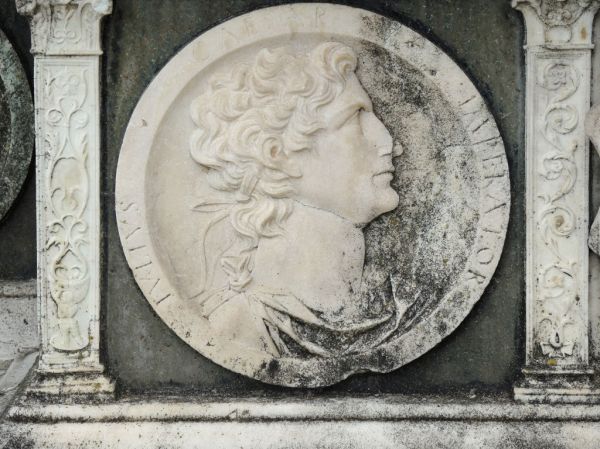In The Roman Revolution, his masterpiece published in 1939, the great classicist Ronald Syme set out to answer a question that he felt his predecessors had failed to consider seriously: How did the Roman Republic, which had survived for half a millennium since the overthrow of Tarquin the Proud in 509 B.C., become the Roman Empire, or—as Syme sometimes referred to it—“the new state”?
His answer was not facile. The revolution was possible, he argued, not because of some sudden transformation, but because of the culmination of a long historical process. Roman civilization was clearly breaking down by the middle of the first century B.C.; the existing republican machinery of state was inadequate to the needs of the Roman people. “[T]he old constitution had been corrupt, unrepresentative and ruinous,” Syme wrote. The Roman governing class was effete, exhausted, and cynical: smug, aloof, petty, factional, myopic, zealous only in defense of its own unearned privileges, immune to the consequences of social dysfunction. It was also incompetent. When Octavian—the ambitious great-nephew and heir of Julius Caesar who later became the emperor Augustus—set about what Syme called his “revolution,” he did so with avowedly benign intentions. He did not, like later revolutionaries, announce his aim of destroying the existing order of things; he did not, for example, set himself against the inherent injustice of the prevailing economic system (though he did effectively replace one set of oligarchs with his own preferred financial caste). On the contrary, he said, what he sought was merely the restoration of the Republic to its ancient glory. The body politic was sick, and only Octavian was sufficiently practiced in physick to restore it to health. (Res Publica Restituta, or “the state restored,” was the slogan of the day.)
His far-reaching changes were accomplished by recycling the constitutive parts of the old Roman state. It was, above all, a question of republican forms repurposed toward authoritarian ends. The powerless Senate still existed in name, and authority continued to flow from the ancient offices of consul and tribune, but its course was directed to run through imperial channels. All the ceremonial trappings of the old society were preserved even as they were being perverted.
By whom was all of this accomplished? Octavian did not act alone, nor was his success a matter of happenstance. He was a shrewd manipulator of events, one who, by sheer force of personality, managed to combine disparate elements within Roman society into a new “Caesarian party.” It was through the creation of this new ruling class—the venal magnates and “robust careerists,” among them some of his own former enemies—that his revolution was principally accomplished and its supposed achievements blazoned as propaganda. These “new men” effectively replaced the old decadent republican aristocracy. The most exalted among them enjoyed power almost on a level with Octavian’s. By 18 B.C., the imperium or personal authority of his lieutenant Agrippa extended even over the city of Rome itself. His person was, literally, sacred: any attempt to harm him, or meaningfully resist his political whims, merited death.
By the end of Augustus’ reign in A.D. 14, the basic structure of Roman society had changed forever. It had been remade entirely in the image of its emperor, who “abrogated to himself all the functions of Senate, magistrates and laws,” as Syme put it, and “entwined himself about the body of the Commonwealth.”
Donald Trump is not Octavian, and Elon Musk is certainly not Agrippa. For some readers, this bald statement of fact will be sufficient to explain why they have not been able to bring about a reorganization of American life on anything resembling the scale of the Roman revolution.
Only six months ago, this did not seem obvious. To many observers, we appeared to be on the verge of an authoritarian coup. Their fears (or, in some cases, hopes) were understandable but, I think, ultimately misplaced. Even now, with Musk’s departure from the extra-constitutional “Department of Government Efficiency” and his pronounced opposition to Trump’s legislative agenda, there are reasons to think that a reshaping of American public life is not quite as imminent as it once seemed.
America’s problems are not, of course, those faced by late republican Rome. But any reader of Syme will nevertheless be struck by some extraordinary parallels: the all-pervading sense of ennui; the widespread dissatisfaction with politicians and hostility toward the professional and managerial classes; the prostituting of hoary phrases and words such as “liberty,” which Syme deemed “a convenient term of political fraud”; the thrusting imperiousness of the new political class and the sheer relentlessness of their semi-assault on existing institutions; and above all, perhaps, the apparent futility of those who actively opposed the new order of things. (“Fools or fanatics perished along with lost causes,” Syme said; “the traitors and time servers survived.”)
These parallels extend even to the structure of power itself. Octavian relied on informal advisers who wielded considerable influence without holding official positions. Musk is indeed their modern analogue. He was not elected, confirmed, or bound by institutional responsibilities or norms of accountability; his authority came directly from the hands of a charismatic executive who had assumed and delegated many of the prerogatives of the legislature. That Musk’s leadership of DOGE collapsed under its own contradictions is, perhaps, telling.
Even the most fervent Trump supporters will recognize some of these parallels. Some may even find in them an agreeably drawn blueprint. Octavian, who in his own lifetime was styled “illustrious” and “father of the fatherland,” is not exactly a byword for political failure. Yet Trump has failed to effect his own Roman revolution—and continued failure is, I think, likely.
Why is this the case? The most obvious answer is that the historical situations are wholly dissimilar. The old American senatorial class—the northeastern WASP establishment so memorably anatomized by E. Digby Baltzell—had already exhausted itself long before the rise of Trump, with the defeat of George H.W. Bush in 1992. Even then, Poppy’s patrician manner, his distrust of ideology, and his unfailing sense of noblesse oblige were relics. His son and namesake, for all the dynastic continuity a second Bush in the White House implied, owed his political ascent more to evangelical populism than to the vanished world of Rockefeller Republicanism. By the time Trump came down the golden escalator there was no aristocracy left to displace—only a set of institutions, decaying but oddly resilient, through which influence continued to circulate without ever quite coalescing around a set of families.
Instead, both power and administrative ability were and remain concentrated in the hands of the professional and managerial classes who, even when they are conservative in temperament, are not broadly sympathetic to Trump’s person or aims; for all the disruption of the last decade, their role has not been seized by a coherent MAGA faction with a shared interest in overturning the old order. The paid-up Trumpists are not homines novi who have clawed their way into the political arena through war or law; they are crankish entrepreneurs, second-rate financiers, and celebrities, orbiting political power rather than wielding it.
Perhaps there can be no American Octavian because there is no American republic. Rome’s revolution was forged in a crucible of repeated civil wars, culminating in a rational imperial bureaucracy. America’s upheaval, in contrast, has produced not one single ruling order, but an array of intersecting authorities—governmental, corporate, algorithmic, judicial—each of which claims legitimacy from a different source and none of which has the final say. This dispersion of power makes a genuine Caesarian moment—whether on the left or the right—unlikely if not impossible. The Roman oligarchy fell to the sword; our elites survive not despite but because of upheaval.
Syme could point to war, proscriptions, and the subsuming of executive power into a single man, but disinterested American observers will see only churn and consensus. No group has emerged from the shadows to run the machinery of the state because the machinery of the state itself is no longer the primary engine of power—that position now belongs to globalized capitalism. One could say that the revolution has already happened—quietly, thoroughly, and without Caesars.
Some amount of dubious credit probably belongs to the oligarchy itself, as it actually exists. The sheer velocity of disruption in American society has tended to inhibit the consolidation of political power rather than facilitate it. Most of our own oligarchs—Jeff Bezos is perhaps the most illustrative example—may appear at political events, hobnob with presidents, or spar with regulators, but their economic dominance is strangely nonpartisan. They thrive under Democratic and Republican administrations alike. The revolving door between business, media, and government is less a conspiracy than a cultural logic: no matter who is nominally in power, the same billionaires are invited to advise on artificial intelligence, attend climate summits, or buy up mass media platforms. What appears as elite consensus is more like elite liquidity.
I for one find this persuasive. For others it may sound unduly cynical (or crudely Marxist). It is not, any rate, incompatible with simpler explanations. Perhaps it is simply the case that what I have referred to as the “machinery” of American governance has a working failsafe. This, perhaps, is the unguessed legacy of the conservative movement: a deep reverence for constitutionalism at which progressives smirked until it became the means of their deliverance. The right-leaning judiciary—including the Supreme Court, to which Trump has appointed three justices—has become the primary means by which executive ambition is checked. In this sense, the closest analogues to Cato the Younger and other republican opponents of the new order may not be media personalities or liberal activists, but constitutional formalists in think tanks and law schools and on appellate benches, who resist perceived corruption not with weapons or speeches, but with legal briefs and procedural maneuvering. Their victories are modest, often ephemeral, and rarely heroic. But unlike Cato, they are not always doomed.
In the end, though, I suspect that the most important difference is this: Octavian became Augustus and consolidated a regime; America metabolizes its would-be emperors. Augustus possessed a singularity of purpose and an iron will, pursuing power with relentless discipline and subsuming personal grievance into a larger, coherent vision of statecraft. The empire he built was not merely the outcome of opportunism or chance, but of a cold, calculating effort to reshape the world in his image.
By contrast, Donald Trump, for all his bravado and recalcitrance, has never demonstrated anything like the steadiness of will that true revolution requires. His political instincts are real, even uncanny at times, but they are constantly overridden by transient whims, feuds, and media cycles. He is reactive where Augustus was strategic, mercurial where Augustus was methodical. Trump’s obsession with optics and love of applause undermine the very authority he seeks to consolidate. In this light, it becomes easier to understand why the United States, for all its problems, has not yet yielded to a Caesar. Every four years, the wheel spins again. The faces change, the tweets accumulate, the gears churn, the average price of publicly traded shares increases. And behind it all, the Constitution—both the document and the set of informal assumptions that still cling to it—remains the load-bearer of a still-functional order.









Please note that we at The Dispatch hold ourselves, our work, and our commenters to a higher standard than other places on the internet. We welcome comments that foster genuine debate or discussion—including comments critical of us or our work—but responses that include ad hominem attacks on fellow Dispatch members or are intended to stoke fear and anger may be moderated.
With your membership, you only have the ability to comment on The Morning Dispatch articles. Consider upgrading to join the conversation everywhere.